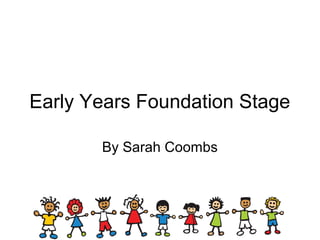
Early years foundation stage
- 1. Early Years Foundation Stage By Sarah Coombs
- 2. Early Years Foundation Stage is defined in Section 39 of the British Government’s Childcare Act 2006 This is effective from September 2008 Six areas of Learning and Development requirements • Personal, social and emotional development • Communication, language and literacy • Problem solving, reasoning and numeracy • Knowledge and understanding of the world • Physical development • Creative development Nine areas of Welfare requirements • Welfare of the child concerned • Arrangements for safeguarding the children concerned • Suitability of persons to care for or in regular contact with the children • Qualifications and training • Suitability of the premises and equipment • The manner in which the EYFS is organised • Procedures for dealing with complaints • Keeping of records • Provision of information
- 3. Simplified framework March 2012 - implemented in September 2012 • It focuses on supporting children • Reduced the number of goals from 69 to 17 • Concentrate on: – 3 prime areas • Communication and language • Physical • Personal, social and emotional – 4 specific areas • Literacy • Maths • Understanding the world • Expressive arts and design – 3 Learning characteristics • Playing and exploring • Active learning • Creative and thinking critically • Introduced a progress check at age 2 – this can assist in additional support before child has started school • Better understanding between staff and parents due to clearer language
- 4. EYFS Profile Carried out in the final term in which the child reaches age 5 • An assessment of the child's progress to inform the parents of their development and characteristics of their learning • Support the changeover from EYFS into Key Stage 1 • To help Key Stage 1 teachers create a suitable curriculum to support the continuing learning of the child
- 5. What does it mean for parents? • The Framework describes how your child will be learning • Staff will ensure the activities are suitable to your child’s unique needs • Activities done at home are important for development • Communicate with “key worker” to make them aware of what your child is capable of at home
- 6. Practitioner duties • Consider the individual needs, interests and each stage of development • Plan an enjoyable and challenging experience for each child • Any concerns about development discussed with the parents • Link families to any extra support or help for educational needs and/or disabilities • Consider children of different ethnic backgrounds – Link role play, cooking and visits to their cultural experiences • Support children who don’t use English as their 1st language – Interact with home language whilst pushing their English • Relationship with parent is crucial to gain knowledge of the child – Regular parents evenings
- 7. Admin duties • Ensure policies are up to date to reflect the framework • Ensure displays are kept tidy and refreshed – Enhances learning and shows parents and children what activities they are involved in • Assist in putting together the child’s learning journey • Minute taking of staff meetings to ensure everyone is aware of the mutual goals
- 8. Ideas • Communication and language – Nursery rhymes and songs – Interactive stories – Signing activities • Physical – Singing and dancing – Cooking • Personal, social and emotional – Send birthday cards • Maths – Counting games • Understanding the world – Grow plants / cress – Role play – Cultural holidays eg, Hanukkah • Expressive Arts – Messy play
